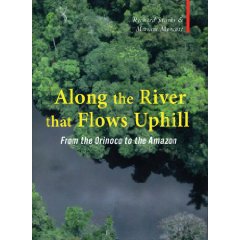Along the River that Flows Uphill - From the Orinoco to the Amazon recounts the journey that two authors, Richard Starks and Miriam Murcutt, took along a remote and strange river in Venezuela called the Casiquiare. At the same time, it examines the risk that is inherent in all adventure travel.
A thoughtful, quick read, Along the River gets is recommended by this reviewer for adventure travel trade professionals, as well as for hearty travelers considering getting a bit further off the beaten path.
By Richard Starks and Miriam Murcutt, Haus Publishing, October 2009 (Amazon)
Chris Doyle, AdventureTravelNews Editor Review:
Along the River that Flows Uphill is a sometimes travel-log, sometimes lesson-based story which captured my interest through its matter-of-fact, vivid storytelling, intriguing metaphysical diversions and beguiling questions about the risks of adventure travel.
Richard and Miriam’s first-hand account of their adventures in Venezuela and Columbia - an area of the world where my knowledge of the landscapes, peoples and Euro-invasive history was lacking - has given me a renewed interest in the Orinoco and Amazon basins. I aim to further explore their book’s ‘Acknowledgements’ section, which lists the sources of many of the book’s well-researched stories.
One of Along the River that Flows Uphill's aims, which emerges near the end of the story, is to point out the need to create a set of standards that can help adventure travelers evaluate the risks they might face. Also, the need to have standards that can help adventure travelers assess whether the company or organization they plan to travel with has good safety-management systems in place to deal with those risks.
In addition to these practicalities, the book unexpectedly involved me by what I found to be a more poignant conundrum on page 193. Here, the authors sum up a metaphor that captures what many in our industry struggle with: whether we - the tourism trade - help or harm the peoples we visit during our travels.
In the end, being a subjective challenge, there are really no right answers, but many varying and informed opinions by those who try to do right and good, and by those who are impacted by their interactions with travelers.
The authors, who co- wrote the book, but wrote it in the first person for simplicity’s sake, have this to say on this subject:
“To my mind, the Yanomami (an indigenous tribe of Venezuela and Brazil who the authors visited on their travels) are struggling to exist in a kind of half-way state – hovering, like Schrodinger’s cat, between survival and extinction – so perhaps, after all, we, too, have broken the anthropologist’s fundamental rule just be being here. Just by observing. Just by opening the box and peering in. Certainly, I think, if we have not done them actual harm, then we have in some way increased their risk. And that is not a comforting thought.”
The authors’ honest, philosophic self-reflections add credibility to the book. Not only in the words above, which they write when they sense they’ve overstepped boundaries, but also in the build-up to them. They adroitly set the stage so that the reader is prepared to receive this question and this message. Their sincere reflections of their river experiences and the people they meet along the way remind me of the internal battles I face as I travel this world, with the hopes of inspiring change and sustainable practices. This book will make me ponder, deeper and further than I have done to this point, and with greater clarity.
From the authors:
The book, called Along the River that Flows Uphill – from the Orinoco to the Amazon (Haus Publishing, London, England, August, 2009), recounts the true story of an adventure travel trip that didn’t run smoothly. As a result, the authors of the book - Richard Starks and Miriam Murcutt - were forced to examine risk and adventure travel, and to look for ways in which to measure this risk.
Their book alludes to BS 8848 - a British Standard developed by the Royal Geographical Society in conjunction with Britain’s adventure travel trade - which is intended to help the travel trade industry anticipate risk and prepare for it. Your membership may not be aware of BS 8848 and may like to know about it. (It applies to the travel trade in the UK, but not yet in the US.)
Along The River that Flows Uphill is a travel book with a difference. It weaves the story of a journey to the Amazon with science, math and reason to explore the risks that are inherent in adventure travel - and, perhaps, in life.
In 2005, authors Richard Starks and Miriam Murcutt were commissioned by Geographical, the magazine of the Royal Geographical Society, to travel the length of a strange river called the Casiquiare in Venezuela.
This river - once the source of great controversy - is like no other on the planet, since it joins two distinct river systems, the Orinoco and the Amazon, by apparently flowing up and over the watershed that divides them.
In their book, the authors tell the story of their journey - including a brush with a tribe of Yanomami Indians, reputed to be “the most violent people on Earth”, and their confrontation with FARC guerillas when they strayed over the border into Colombia.
But the book is more than the account of a physical journey, since it also explores thoughts and ideas relating to risk and adventure travel.
Along The River that Flows Uphill is the second book the two authors have written together. Their first, called Lost in Tibet, was reviewed by National Geographic Adventure, which described it as “entertaining and well-written”, and Climbing magazine which called it “a page-turner for readers enamored of true-life adventure tales”. Lost in Tibet is now in its third printing, and the authors have recently sold an option for the film and television rights.
